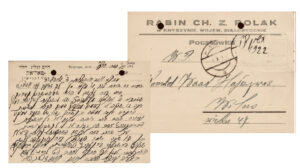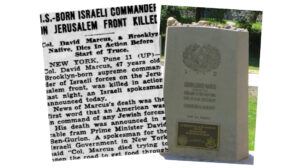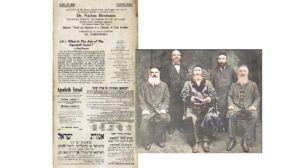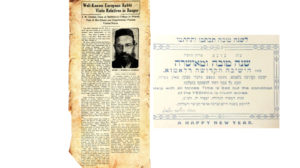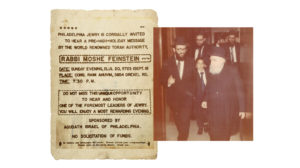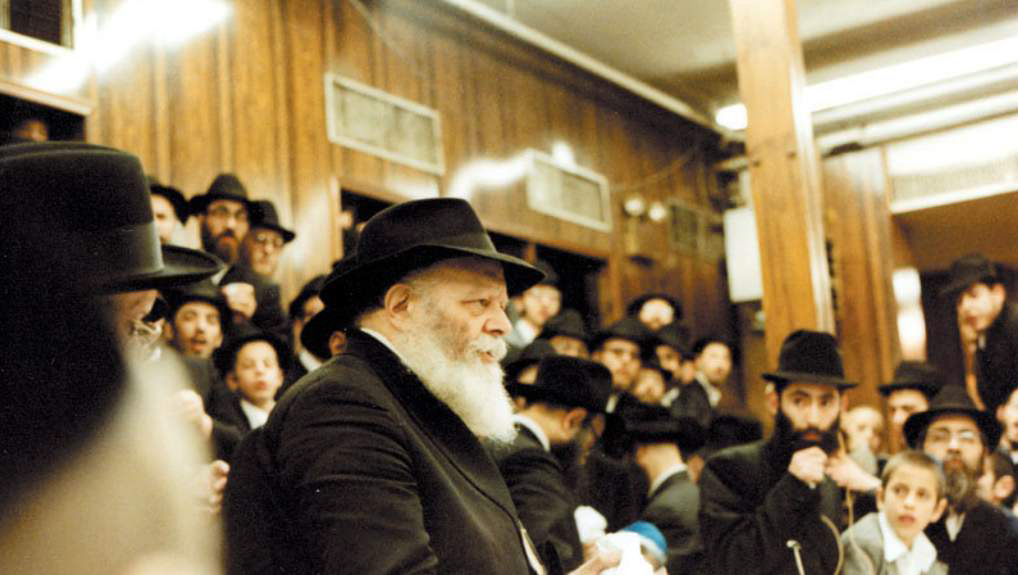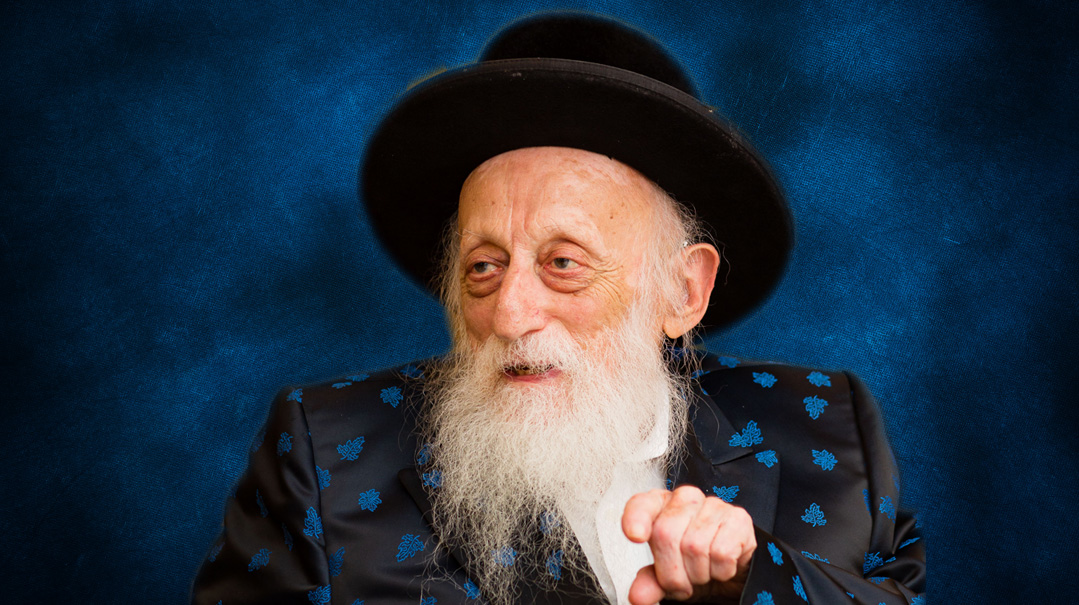Oath of Honor
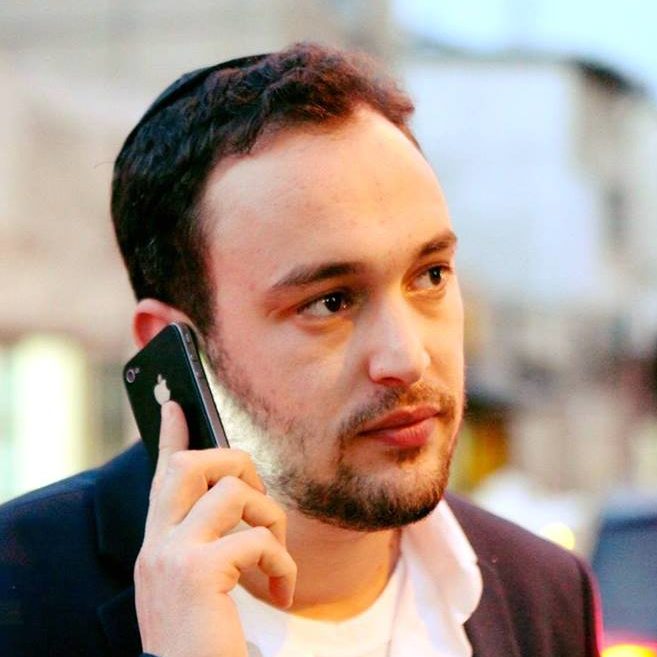
In 1951, American Leonard Wisper lay critically injured in a North Korean POW camp. He made a bargain with G-d that if he survived, he’d start keeping mitzvos
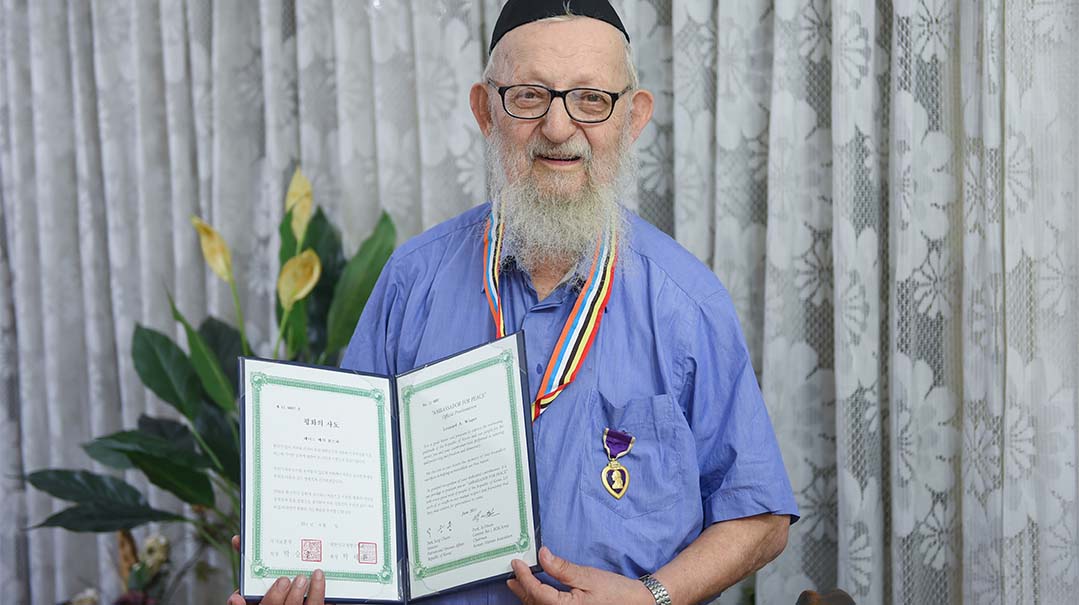
L
ast month’s Singapore summit between the US and its one-time archenemy North Korea had millions around the world riveted as President Donald Trump made good on his assertion that he’d “be willing to eat a hamburger” with North Korean’s Kim Jong-un. And while the two leaders were all smiles, one elderly resident in a small Bnei Brak apartment watched the historic meeting with tears in his eyes.
For Chicago-born Leonard (Ezriel Aryeh Leibish) Wisper, 89, the summit was more than just a handshake between heads of state who’d been hurling dire threats at each other for months. It was a flashback to the Korean War, where the deep-rooted strife began, filling his memory with images of deadly minefields, massive casualties on both sides, gruesome scenes of blood and death — and of a young soldier in enemy captivity calling out to the G-d of his fathers, although he didn’t even know His Name.
Calling All Men
As a product of the Cold War between the Soviet Union and the US, Korea had been split into two regions with separate governments, both of whom claimed to be the legitimate government of the entire country. The Korean War, which lasted from June 1950 to July 1953, began when communist-backed North Korea — aided by China and the Soviet Union — invaded South Korea. The United Nations, with the US providing 90 percent of the military personnel, came to South Korea’s defense.
After the first two months of war, South Korean and dispatched US forces were forced back to a small area in the south known as the Pusan Perimeter. A counter offensive saw the UN forces beginning to advance, only to be cut off again by a million-strong Chinese army who joined with the North Koreans. During these reversals of fortune, South Korea’s capital city of Seoul changed hands four times. The fighting ended three years after it began, incurring a death toll of 2.5 million people. But although a demilitarized zone was created between North and South Korea, no peace treaty was ever signed until just this past April. And while South Korea prospered and Seoul has become a bustling metropolis, across the border, North Korean citizens are on the brink of starvation, while its government has been continually pumping its resources into its military and nuclear weapons program.
Wisper, who was 21 in 1950, didn’t dream he’d be shipped out to join the forces on the Korean Peninsula. He grew up in Chicago to a Jewish family that had immigrated to the US from Poland so that his grandfather wouldn’t be drafted to the Polish army.
“The Zeide was an observant Jew,” says Wisper, “but when he came to America, the challenges of keeping mitzvos properly were too daunting, and so he went back to Poland, where he was later murdered in the Holocaust along with most of the family that remained there. My father stayed in America, though, but within a few years, his mitzvah observance dropped.”
Wisper says the store where his father found a job required him to work on Shabbos, and like many others, “he felt he had no choice. He had to support us. The next generation, my siblings and me, grew up in a home where we would go to shul on Rosh Hashanah and Yom Kippur and didn’t eat chometz on Pesach, but that was about it.”
Lenny Wisper was in college and holding down a good job in auto repair — with no desire to serve in the military — when the draft notice came in the summer of 1951. “Army service was not part of my dreams,” he says. “I had suffered from a spinal injury and was sure they wouldn’t take me.”
But the US, still reeling from World War II just a few years before, was under tremendous pressure and needed manpower. “At first they sent the American forces who’d remained in Japan to fight in Korea,” he says, “but a few months after the war broke out they began to call up thousands of soldiers, especially since the Chinese, with their million-man army, joined North Koreans. So although I was far from perfectly fit, I was shipped out.”
Lenny was sent for basic training, and a few days before Yom Kippur, he boarded a military ship headed for Japan, along with 1,500 other soldiers trying to battle their seasickness on the way. “There was a religious soldier, maybe he even served as a rabbi, who gathered the Jewish soldiers to daven on Yom Kippur. We davened, even though we didn’t know much about Yiddishkeit, and most of us were not religious at all. But when you’re on your way to war at the other end of the world, who wouldn’t want to daven?”
When the ship docked on Japanese shores, the fighters debarked and were sent to another training course before being deployed to the front. “At the time,” recalls Wisper, “the only automatic weapons we had were some submachine guns left over from World War Two and that’s what we used for training. Those guns had long bayonets, and they taught us how to attack first with the bayonets in order to stab the enemy before using the bullets.”
Then the soldiers departed on small boats to Pusan, the large port city in South Korea that became its temporary capital during the war. The biggest shock for the thousands of soldiers coming from the mighty United States, he says, was the discovery that fighting against the North Koreans and their Chinese communist allies was an extremely complicated and painful endeavor.
“There was a lot of frustration,” Wisper, who worked as a machine-gunner, says. “It was sort of like a ping pong game, but with bodies as the score card. Sometimes it was North Korea that captured territory and we liberated it and then they captured it again. Other times, we captured territory, the North Koreans liberated it, and we captured it again. This went on over and over again. In every such round, thousands of soldiers on both sides were killed.
“One of my jobs was to bring back the American soldiers who fell in these battles. The scenes were indescribably gruesome. Some of these men were my friends, they were in my unit. The South Koreans weren’t prepared for the invasion, and we, the American soldiers, needed time to mobilize against the intensity of the North Korean and Chinese forces. One time we got to a field where I saw some American soldiers lying on the ground. At first I thought they were resting, but then I realized they’d been killed by shelling.”
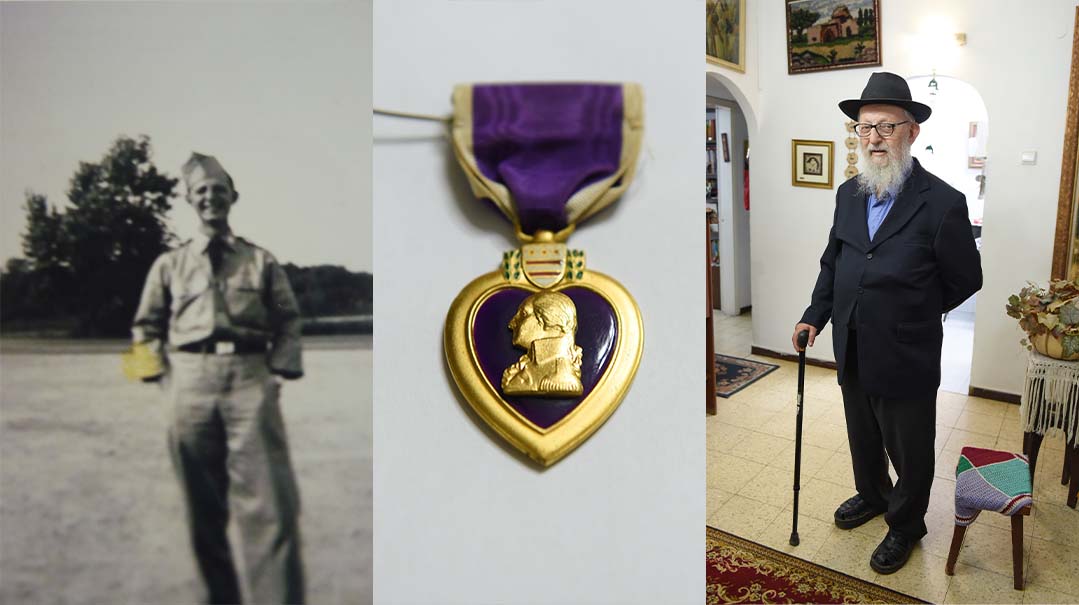
Split-Second Salvation
A few months into battle, Wisper realized that every day he was still alive was something of a miracle. And then came the direct hit to his outpost in the middle of the night.
“My partner was killed instantly, and I was knocked unconscious,” he says, replaying the scene he’s relived thousands of times over the last six decades. “When I came to, I heard the voices of Chinese and North Korean soldiers, but I couldn’t move. The pain was excruciating. I didn’t feel my legs, and one of my eyes was badly injured. It took me a few seconds to realize I was surrounded by enemy soldiers.”
When he was finally able to raise his head, he saw his friends, the other soldiers in his unit, lying sprawled all around. Most of them were dead; a few were critically wounded. “I also realized that I was going to be taken into captivity,” says Wisper, “and we’d all heard the horrifying rumors about what happened to Americans taken prisoner by the North Koreans. I was in agony, but I forced myself not to moan or make a sound, hoping the enemy troops would leave the area without noticing I was alive — maybe that way I’d survive.”
It might have been a good plan, but a few minutes later, another injured soldier lying nearby began to groan in pain. The Chinese captors quickly came over, realizing they had a prize — living, wounded Americans. Seconds later, Wisper and the others still among the living were dragged to a hiding place.
“I was thrown into a small bunker in the area,” he remembers. “The Chinese would build makeshift bunkers on all the battlefronts, and the one they dragged me into was already occupied by three frightened, injured Americans. To his credit, the Chinese soldier who had captured me pulled out a rice ball that was probably meant for him, and tossed it in my direction,
“Still, I was pretty sure I was dead meat,” he continues. “For the Chinese, I was a burden because I was injured. This was just a holding bunker and they were going to march us to a bigger detention center, but since I couldn’t walk and I’d hold up the convoy, I assumed they’d just shoot me and finish me off.
“At that point it was pretty clear that only a miracle could save me — but how to pray to G-d who I had basically ignored my entire life up to then? So I focused and said, with every fiber of Jewishness I could muster up into my consciousness, ‘Merciful Father, if You help me get out of here I will return to You.’ I didn’t know the nusach of tefillos or Tehillim then. I just spoke to Hashem in my language, in my own words. I promised that I would begin to keep Torah and mitzvos if I emerged from there alive.”
After half a day in the bunker, bleeding and wounded, Wisper heard shelling and soldiers shouting in English. He realized that American troops had come to rescue them.
“An hour later, one of the Chinese guards peeked into the bunker, looked in my direction, and emitted a string of curses as he pulled out a grenade. That’s when I realized we were really finished. In a few seconds he’d toss the grenade into the bunker and we’d be blown to smithereens. I watched as he pulled the pin and threw the thing in — and somehow, in that split second, I got the strength to leap over, grab it before it detonated and throw it back out of the bunker, where it exploded in a blast of smoke and fire. The soldiers who were with me hugged me with a joy that’s hard to describe. ‘You saved our lives!’ they shouted. A few minutes later, American soldiers came and rescued us.
“They put me on a military jeep and took me to a field hospital, where they began to extract the shrapnel from my body. The shrapnel was embedded all over and it took hours to get the pieces out. One piece was a millimeter from my eye — only a miracle saved my vision.” Wisper was later sent to a hospital in northern Japan for recovery, and then returned to the US.
The Promise
The war raged on for another two years; with the cease-fire in 1953, Wisper was discharged from the army, but the memory of that oath in the bunker loomed large. “When I promised to do teshuvah, I didn’t really understand what it meant,” he admits, “but when I returned home I discovered that it wasn’t so simple. There was no teshuvah movement then, no Aish and no kiruv industry, but I knew I had to change my life.”
He began to seek out Jewish centers in Chicago, but, he says, “In those days, even the religious rabbis in Chicago were pretty liberal by today’s standards. So I began to go to shul on Shabbos and to keep a few mitzvos, but I didn’t have the fire — I felt somehow that I wasn’t really fulfilling my promise.”
In the summer of 1957, Wisper made his first visit to Israel. It was a time when everyone had to dig in their heels — it was toward the end of the Austerity period when staple foods and supplies were rationed, and when Jordanian snipers and infiltrators were a threat to daily life — but Wisper was unfazed. Something inside shifted, and when he returned to Chicago, he began wearing a yarmulke in public and had become fully mitzvah-observant.
At the time, a religious Israeli girl who worked at the Israeli consulate in Chicago was suggested as a match for him, and they were married soon after.
The Wispers made aliyah in 1965, with their two daughters. They first lived in Jerusalem, where they had a son, and soon afterward, they moved to 4 Chazon Ish Street in Bnei Brak — right across the street from Rav Aharon Leib Steinman ztz”l. “He was our special neighbor,” says Wisper. “I was still pretty new to Yiddishkeit, and for years I’d go in and ask him every halachic question I had. That was before he was ‘discovered,’ before tens of thousands of Jews would converge on his little, dilapidated apartment. But the Rosh Yeshivah never changed. Even as the leader of chareidi Jewry, he always treated me the same way he did in the earlier years, and that’s how he treated everyone else as well.
Wisper worked as an accountant until his retirement about 20 years ago, and since then has kept up the learning schedule he’s been sticking to for the past 35 years: his daily seder at the Nesivos Olam yeshivah in Bnei Brak. Since his retirement, he’s added a second afternoon seder as well.”
He didn’t think too much about his Korean adventures until 2011, when he heard that Korean ambassador to Israel Ma Young-sam was looking for Jewish soldiers who had fought in the Korean War, so that his government could express its gratitude. South Korean embassies annually honor veterans in the 16 countries that fought the North under the United Nations banner. While Israel, a two-year-old struggling country at the time, didn’t send soldiers to fight in the Korean War, Prime Minister David Ben-Gurion did support America’s pro-South efforts against the Soviet Union-backed North, and also sent $100,000 in food items to South Korea — a substantial gift at the time, especially considering Israel’s own precarious situation.
The Korean envoy spent several years tracking Jewish war veterans, and discovered that about 4,000 Jewish soldiers were dispatched to South Korea. In Israel, he discovered seven veterans, Wisper among them.
Sixty years after Wisper saved his American comrades in that enemy bunker, he received a medal of honor from the South Korean ambassador, and — accompanied by his children, grandchildren, and great grandchildren, some of whom probably never even heard of the Korean War — delivered an emotional speech in which he eulogized the Jewish soldiers who had lost their lives in the region.
Wisper has been attending the South Korean embassy’s ceremony every year since, and has developed a warm relationship with the embassy staff. That relationship paid off, when the South Korean ambassador approached Nesivos Olam Rosh Yeshivah Rav Yosef Bruk, requesting a visit to the yeshivah to learn about its Torah learning methods. Of course, Wisper was his personal tour guide.
“Afterwards,” says Aryeh Leibish Wisper, “we sat down at a festive banquet held in his honor and he related his dream to include Talmud studies in the South Korean study curriculum. We’ve all heard in the last few years how the South Koreans are fascinated by Gemara and how it’s being studied there, and for the ambassador to sit in a beis medrash in Eretz Yisrael, it was a special honor for him. For me, it was like coming full circle — my promise fulfilled in a way I would have never imagined.”
(Originally featured in Mishpacha, Issue 718)
Oops! We could not locate your form.
